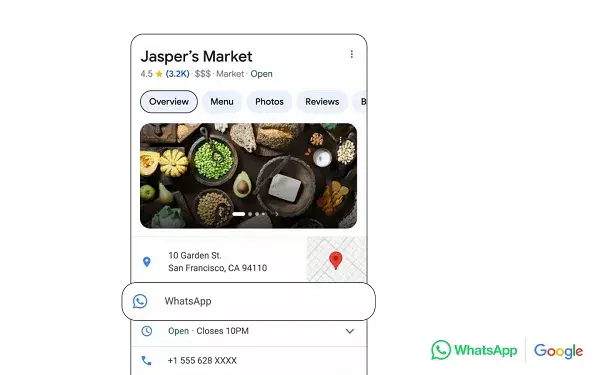Meta’s latest advancements reveal a clear strategic vision: transforming business-to-consumer communication into a seamless, integrated experience across multiple platforms. In an era where messaging surpasses traditional social media sharing in popularity, Meta is pivoting aggressively to dominate this space. Their efforts to embed WhatsApp buttons directly into Google Business Profiles exemplify this shift toward making business contact as frictionless as possible. By enabling users to initiate conversations with just a click from Google Search or Maps, Meta is effectively removing barriers that previously impeded quick interactions. This move is not merely cosmetic; it’s a calculated attempt to boost engagement metrics and create a more fluid customer journey. This integration suggests Meta recognizes that the future is less about isolated apps and more about interwoven communication channels that meet consumers where they are — in this case, right on their favorite search platforms.
What stands out here is Meta’s acknowledgment of the importance of context-aware contact options. The ability for users to open links within WhatsApp itself minimizes app-switching, an obstacle that often causes drop-offs. When customers can move from discovery to engagement without leaving the messaging environment, conversions are inherently more likely. This trial of native link opening within WhatsApp indicates a focus on enhancing user experience — a central theme that often goes overlooked amidst the push for features. In the competitive landscape of digital marketing, such improvements could serve as a critical differentiator for brands willing to adapt quickly.
Flexible and Cost-Effective Messaging Solutions for Modern Businesses
A major concern for many entrepreneurs and marketers remains cost management, especially as messaging platforms become more feature-laden. Meta’s announcement of a new tiered pricing model for the WhatsApp Business Platform reflects an understanding of this challenge. By introducing volume-based tiers, Meta provides businesses with options that scale with their needs, making sophisticated messaging tools more accessible to small and large enterprises alike. This move democratizes enterprise-level communication, empowering smaller businesses to engage customers more effectively without prohibitive costs.
The enhanced advertising options further bolster this strategy. Meta is expanding click-to-message ads to include new optimization objectives focused on purchasing and lead generation. This shift signifies a recognition that messaging ads must be outcome-oriented, not just engagement-driven. By aligning ad performance metrics directly with tangible business results, Meta is encouraging advertisers to see messaging not as an expense but as a strategic investment capable of delivering measurable ROI. Furthermore, the introduction of automated destination messaging — which opens ads directly into WhatsApp, Messenger, or Instagram Direct — underscores a desire to meet consumers precisely where they want to communicate, boosting response rates and overall effectiveness.
Integrated and Innovative Tools to Drive Customer Satisfaction and Loyalty
Meta’s push to synchronize its messaging tools across platforms indicates a deeper understanding of customer needs. By allowing businesses to manage WhatsApp Business Platform features alongside the WhatsApp Business App, Meta simplifies operational workflows and reduces friction for companies seeking to adopt a multi-channel approach. This flexibility enables businesses to scale their messaging efforts without being confined to a single app or interface.
Moreover, the testing of native order tracking via WhatsApp, integrated with shopping platforms like Shopify and WooCommerce, represents a significant leap toward a “commerce-enabled” messaging environment. Customers can check their order status without leaving the chat window, creating a more personalized and frictionless shopping experience. Additionally, the ability to send verification codes and one-time passwords directly through WhatsApp addresses critical security needs while maintaining convenience.
Meta’s enhancements for Messenger, such as caller ID updates and AI-driven call summaries, aim to transform the platform into a more dynamic and insightful communication hub. These features not only streamline customer service interactions but also demonstrate Meta’s commitment to leveraging AI to improve business operations. The rollout of new APIs and messaging solutions for marketers further indicates Meta’s strategic intent to make these tools indispensable to modern businesses.
Implications for Businesses and the Future of Messaging
Meta’s aggressive expansion into business messaging underscores a broader industry trend: personalization and immediacy are king. By offering diverse, integrated, and outcome-focused tools, Meta positions itself as the backbone of future enterprise communication strategies. For businesses willing to adapt, these developments promise more efficient customer interactions, higher conversion rates, and ultimately, stronger brand loyalty.
However, embracing these new features demands a proactive mindset. Companies must reconsider their communication strategies, ensuring they leverage these APIs and integrations effectively. Failing to do so could result in missed opportunities in a competitive landscape increasingly driven by instant, meaningful engagement. As Meta continues refining its messaging ecosystem, brands that innovate and prioritize seamless customer experiences will emerge as the leaders in this new era of digital interaction.

